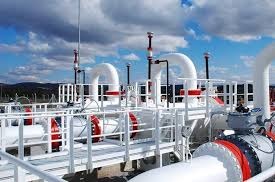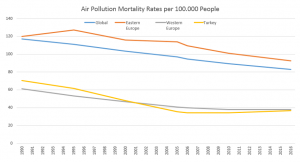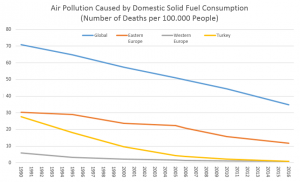SUMMARY:
While transition to natural gas for the air quality is still being debated in many countries around the world, Turkey’s transition in the 1990s and early 2000s was reflected dramatically in the statistics. A considerable drop has taken place in the household and environmental risks stemming both from air pollution and the use of solid fuels. The single most important factor that singlehandedly affects the air quality in Turkey is the penetration of natural gas in cities. This has allowed the quality of life to be improved for many and has saved countless lives.
METHOD:
Data sets, from the Institute for Health Metrics and Evaluation (IHME), under the University of Washington, pertaining to mortality rates and risks were used. The data was drawn with Global Burden of Disease visualization tool.
ANALYSIS:
Studying the number of deaths caused by air pollution per 100.000 people, Turkey’s more successful performance against Western Europe stands out, especially after 1990s with the increasing penetration of natural gas. The death toll, which was 70 per 100.000 people, has caught up with Western Europe in 2000 and was observed to be 36.5 in 2016. This figure remained 38 in Western Europe. And while the reason behind the slight increase in deaths caused by air pollution between 2010 and 2016 is not entirely clear, the increasing number of diesel vehicles is one of the factors that should be examined.


The reason why this incident may be diesel-originated is the statistics given on “domestic solid fuel consumption” in one of the subcomponents under the air pollution mortality index. The statistic in question has dropped fairly rapidly from 2,18 in 2010 to 0,97 in 2016. In Western Europe this figure is 0,92 for 2016.
CONCLUSION:
The most important factor keeping the pollution relatively low in Turkey, while London, China and India struggle with it, is the penetration of natural gas in large cities. Both the households and the industries have increased their usage of natural gas. This was further supported by the government’s resolve to keep natural gas prices reasonable, accessible and reliable. The expansion of natural gas usage in urban and industrial settings can be accepted as one of the most notable steps taken for health in the country.
The thought provoking point that emerges between the two charts is that the air pollution has remained relatively flat since 2010, despite the continuing decline of deaths due to soot-smoke-poisoning in households. It may be useful to look at transportation policies here as well. We will continue to address the effects of natural gas in air quality in Turkey.
